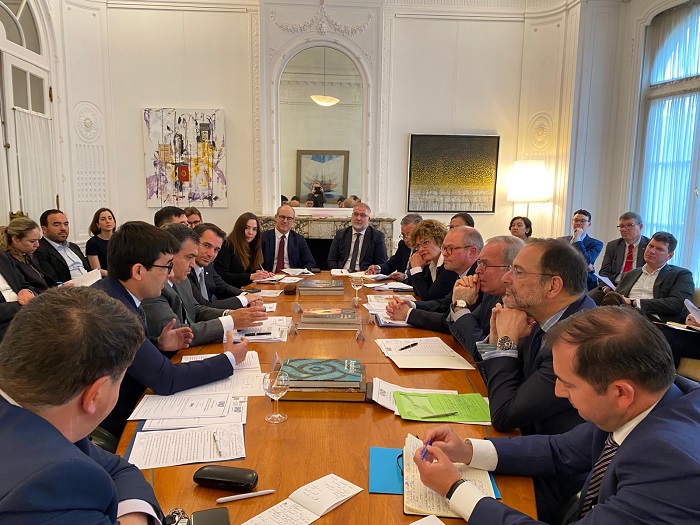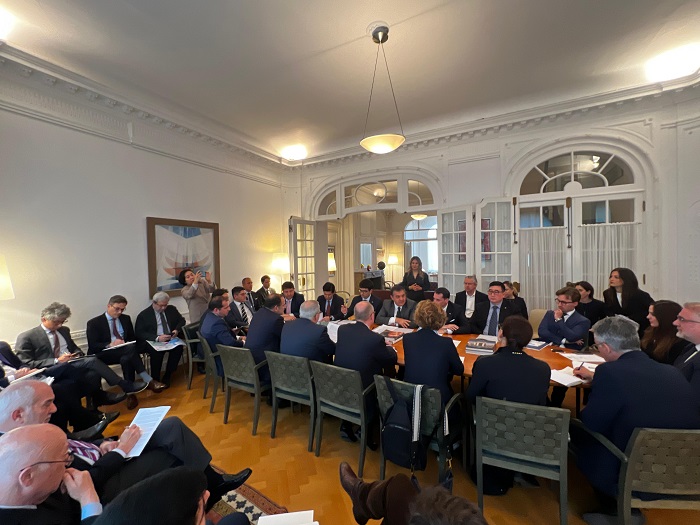 A round table was held in Brussels on the perspectives of the EU’s Global Gateway initiative and unlocking the full potential of the Trans-Caspian transport corridor.
A round table was held in Brussels on the perspectives of the EU’s Global Gateway initiative and unlocking the full potential of the Trans-Caspian transport corridor.
The event was attended by the heads of the European Commission, including the EU Directorate General for Transport, the European External Relations Service and other EU institutions. The heads of diplomatic missions of Türkiye, Azerbaijan, Romania, Kazakhstan, Turkmenistan, as well as heads of various research organizations in the field of transport and logistics companies were also present.
The participants discussed the EU’s Global Gateway initiative and the importance of the Middle Corridor for the sustainable development of transport links between Europe and Asia. It was noted that this corridor can significantly contribute to the stability and growth of trade in the region, especially in conditions of instability of other routes.
The Trans-Caspian Corridor is envisioned not just as an intercontinental link between China and Europe, but also as a tool to bolster regional trade and supply chain movement between the EU, Türkiye, the Caucasus, and Central Asia.
 It was noted that the new composition of the European Commission and the European Parliament will play an important role in the further development and development of a sustainable Trans-Caspian corridor. New investments in hydrogen, solar and wind energy are driving increased trade and shifting supply chains. The establishment of a coordination mechanism for transport projects in Central Asia should improve cooperation between the business communities of the EU and Central Asia.
It was noted that the new composition of the European Commission and the European Parliament will play an important role in the further development and development of a sustainable Trans-Caspian corridor. New investments in hydrogen, solar and wind energy are driving increased trade and shifting supply chains. The establishment of a coordination mechanism for transport projects in Central Asia should improve cooperation between the business communities of the EU and Central Asia.
The Ambassador of Turkmenistan Sapar Palvanov emphasized the country’s strong commitment to developing the Trans-Caspian Transport Corridor. He highlighted Turkmenistan’s strategic location and significant investments, exceeding $15 billion since 2015, in building roads, railways, airports. In 2018, the Turkmenbashi Seaport was commissioned, in the construction of which $ 1.5 billion was invested and which has the capacity to handle 25 million tons of various cargoes through modern terminals.
Palvanov stressed active collaboration with European partners to attract investment and expertise in port management. Upgraded railways exceeding 5,000 kilometers ensure reliable domestic and regional connections.
The second phase of the construction of 600-km long Ashgabat-Turkmenabad highway has recently been completed, which will significantly accelerate the transit of goods and improve regional transport links. The Ambassador also noted that Turkmenistan actively participates in international initiatives and forums aimed at developing transport corridors.
At the investor Forum in Brussels, Turkmenistan presented its projects and attracted considerable attention from international investors and logistics companies. Turkmenistan plans further development of transport infrastructure, including the construction of new railways and highways, as well as active participation in the Global Gateway initiative. ///nCa, 21 May 2024 (in cooperation with the Embassy of Turkmenistan in Belgium)